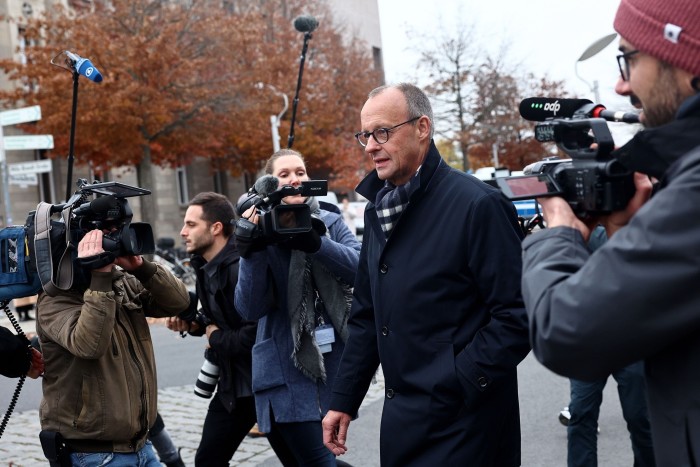German opposition leader Friedrich Merz has called for snap elections as early as January following the collapse of Olaf Scholz’s government, as he warned that the country could not risk a long period of political uncertainty.
The head of the conservative Christian Democratic Union on Thursday rejected the timetable set out by the German chancellor after he broke up the governing coalition — a move that marked the climax of a long-running row over how to boost growth and plunged Europe’s largest economy into political turmoil.
Merz heaped pressure on Scholz, saying there was “no reason” to wait until January 15 to table a confidence vote in the Bundestag — which meant that the earliest the snap poll could be held was March. His call was echoed by leading business figures who warned of the need for urgent action to revive the German economy.
The opposition leader said his parliamentary group, which includes the CDU’s Bavarian sister party the Christian Social Union, had unanimously agreed to tell Scholz to hold a confidence vote “immediately, at the start of next week at the latest”. That would allow elections to be held in the second half of January.
Scholz said that he wanted to work together with the CDU to push through measures to support the economy. According to a CDU official, the chancellor told Merz during a 25-minute meeting on Thursday that he aimed to stick to his proposed timetable.
But Merz said before the meeting: “We simply cannot afford to have a government with no majority in Germany over several months,” followed by a months-long election campaign and weeks of coalition building. “Things have got to happen quickly.”

Leading business figures also warned of the dangers of more uncertainty. “In view of the global political situation and the negative developments in the German economy, we need a new, effective government with its own parliamentary majority as soon as possible,” said Siegfried Russwurm, head of Germany’s main business lobby, the BDI.
Christian Sewing, chief executive of Deutsche Bank, warned that every month of inaction risked causing “a year of missing growth”.
“Germany is facing major economic challenges,” he wrote on LinkedIn. “That is why we can no longer afford to stand still.”
German output is expected to shrink for the second year running in 2024 amid deep problems in the car industry and the chemicals and engineering sectors. Germany’s woes risk being compounded by the re-election of Donald Trump, who has vowed to pursue protectionist policies that would strike a heavy blow to European exports.
Robert Habeck, Scholz’s Green vice-chancellor, warned on Thursday that new elections would not necessarily end the country’s political instability given the surge in support for fringe parties in recent regional elections.
He pointed to the eastern state of Saxony, where efforts to form a three-way coalition between the CDU, the Social Democrats (SPD) and far-left Sahra Wagenknecht Alliance (BSW) collapsed on Wednesday.
He insisted that the remaining SPD-Greens minority government would keep making decisions, though he conceded that he did not expect a “great willingness to help” from opposition parties on passing legislation, including on the 2025 budget.
Germany’s long-term borrowing costs rose to their highest level since July following the collapse of the coalition, as investors priced in the possibility of more German borrowing after Scholz sacked his hawkish finance minister Christian Lindner. The 10-year government bond yield was up 0.07 percentage points to 2.46 per cent.
As European capitals were left stunned by the collapse of Scholz’s coalition just hours after the US election result, Nato secretary-general Mark Rutte voiced confidence that Berlin would “fulfil its obligations” on defence and foreign policy. Germany is the second-largest provider of military aid to Ukraine after the US. “I am not worried about that,” said Rutte as he arrived at a meeting of European leaders in Budapest.
European Commission president Ursula von der Leyen, a former German defence minister, said the government crisis was “for Germany to discuss”.
Following the sacking of Lindner late on Wednesday, German officials announced he would be succeeded as finance minister by Jörg Kukies, the chancellor’s closest economic adviser for the past six years.
Scholz said he fired Lindner, head of the liberal Free Democrats, after he refused to suspend Germany’s “debt brake”, its constitutionally anchored cap on new borrowing, in order to increase support for Ukraine as it battles Russian aggression.
Lindner, a fiscal hawk, said altering the debt brake would amount to “violating my oath of office”.
In an emotional speech on Thursday, Lindner said he “suffered” during his three years in Scholz’s three-way “traffic-light” coalition, accusing the chancellor of being unwilling to compromise.
In a sign of divisions within the FDP, transport minister Volker Wissing unexpectedly announced that he would resign his party membership in order to remain in his post.
Additional reporting by Raphael Minder in Warsaw and Ian Smith in London




































































































































































You must be logged in to post a comment Login